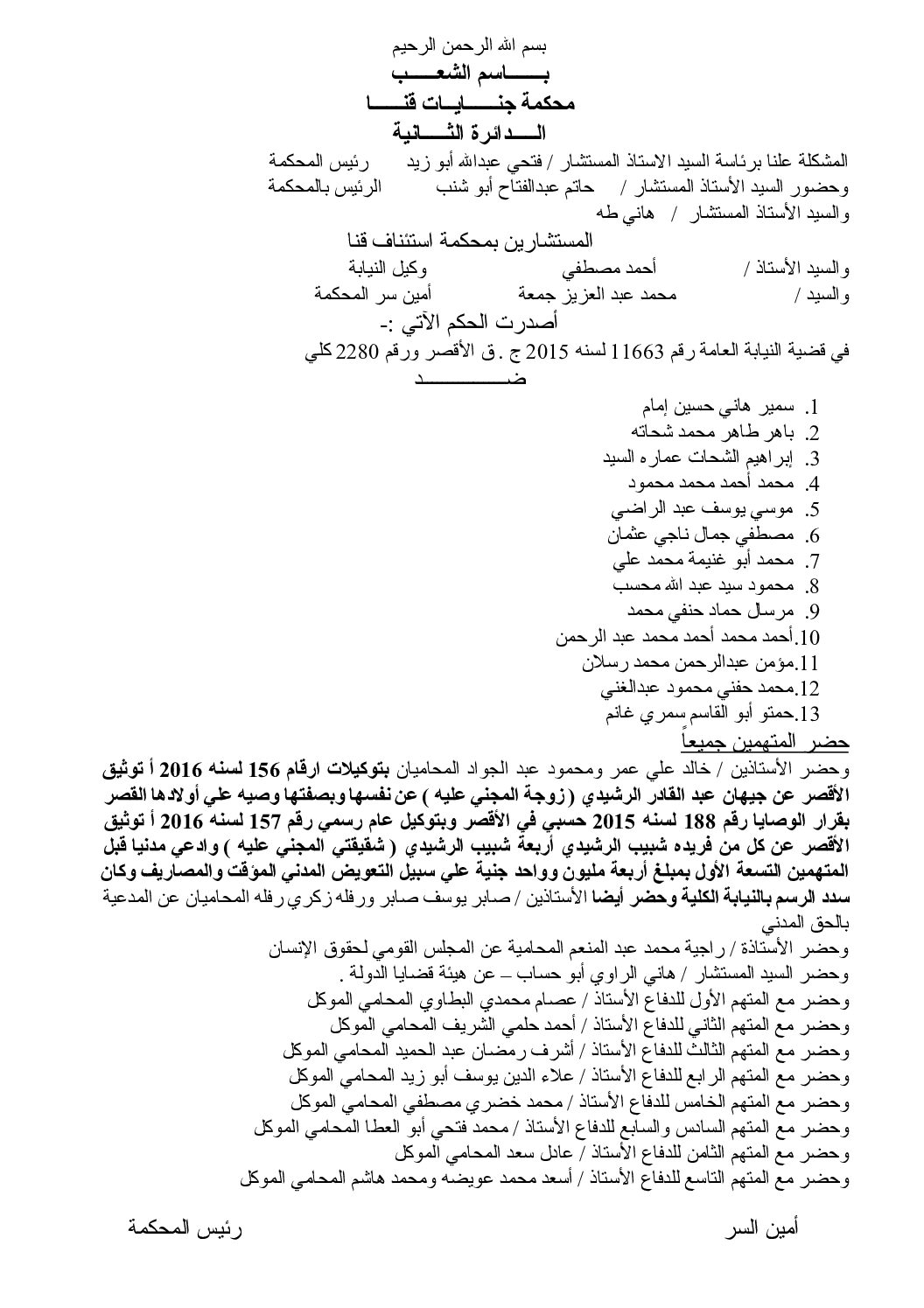Labor Rights | Temporary Labor in Egypt and the Right to Permanent Jobs – ECESR Press Conference Coverage

Press report: ECESR press conference coverage:
Temporary Labor and the Right to Permanent Jobs after Administrative Court Ruling
Yesterday, the Egyptian Center for Economic and Social Rights (ECESR) organized a joint press conference with Towards a Fair Labor Law campaign about temporary labor and the right to permanent jobs. The conference hosted Saoud Omar, a unionist at Suez Canal Authority (SCA) and consultant for the Regional Federation for Independent Unions in Suez. Alaa Abdel-Tawab, head of ECESR legal unit, also talked during the conference. Mohamed Abdel-Kereem talked about bread distribution workers in Behera, Al-Sayid Al-Naggar talked about agricultural labor in Shorouq and Tenth of Ramadan cities, and Hassan Allam and Ibrahim Zaaboub talked about Ministry of Endowments mosque labors.
The conference shed light on the huge issue of temporary labor in Egypt that constitutes 60% to 80% of the labor force that consists of about 28 million Egyptians. The conference demanded justice for those workers through the implementation of the ruling issued late January from the Administrative Court. The ruling ordered the government to offer permanent jobs to employees working on temporary contracts.
Informal Labor
Saoud Omar inaugurated the conference by an introduction about the concept of informal labor. He explained that terminology used in formal and informal labor is about the legal explanation for labor relations and whether adequate work and contracting conditions are met.
He said the informal sector appeared because the economy was not able to handle formal labor. Businessmen and even the government resorted to outsourcing, where workers are employed without documentation through a contractor or mediator.
He added that law number 12 of 2003 contains articles that tried to breach the gap between formal and informal labor conditions. Article 16 bans outsourcing companies and forces companies to hire workers directly. Article 79 enforces equality between contracting workers and permanent workers.
Omar pointed out that another door for outsourcing is occasional labor, which is work that does not fall under the activities of the firm. But some firms hire ordinary labor as occasional labor to avoid offering permanent jobs to those workers.
He explained that the state established projects in governorates, like bread and quarries in Suez, and dealt with it as an employer hiring workers for a specific project. For example, the quarries project in Suez renders 90 million pounds annually for the governorate. The project employs about 600 workers are facing problems with the government that is trying to absolve itself from the documented work relationship with them.
He said that in 2011 Field Marshal Hussein Tantawy issued a decision to offer permanent contracts to employees working on temporary contracts in administrative state institutions for three or more years. The decision covered some workers in Suez projects even though they were working as per law 12. He added that the state is resisting the decision to offer permanent contracts to temporary workers, and that corruption among officials results in removing temporary workers and bringing their relatives in their places.
Legal background: effects of administrative court ruling
Alaa Abdel-Tawab, head of ECESR legal unit, linked between the issues of workers attending the conference and the ruling issued late January to offer permanent jobs to anyone working on a temporary contract more than 6 months. Although many laws, decisions and ruling granted public rights and freedoms to Egyptians, The State Council is special. He alluded to three rulings issued a year before the January revolution under Mubarak’s regime:
- Nullity of Madinaty land sale
- Forcing the state to introduce a fair minimum wage
- Kicking university security out of campus
The ruling issued in 26 January 2015 to compel the state to hire a temporary worker after days of detaining workers in Behera just for demanding permanent jobs. Although the ruling does not raise great hopes because it can still be challenged twice, the ruling is valid and will be upheld because it implements a law.
Alaa Abdel-Tawab said the case was not successful in specifying demands. It was a great chance to gain a paramount ruling that includes all temporary workers under law 19 of 2012 amending the law of civil workers number 47 of 1978. Mohamed Helmy Ibrahim Mohamed who filed the case and his defense team did not include workers from other sectors. If that would have happened, the ruling compelling the state to hire permanently workers who worked more than 6 months in temporary jobs would have been different and more inclusive. The judge implemented a well-known judicial rule to abstain from exceeding case demands.
The good thing about the ruling is that it mentioned the violation the Prime Ministry committed in decision number 641 of 2012 based on law number 19 of 2012. The decision Kamal El-Ganzouri issued postulated three years for temporary workers before permanent hire, while law number 19 specifies the period to be only 6 months.
We are currently concerned with upholding the ruling.
Cases of temporary labor
Bread distribution representatives
Mohamed Abdel-Kereem, a bread distribution representative in Behera, said the project started in 1996. They continued working even though financial compensation decreased to two pounds for each subscriber. The revolution gave them hope in enhancing their situation, but Damanhur City Council and the Governor of Behera invited them on the first of March 2011 to sign contracts they found out does not include previous years of service. But they agreed to be hired permanently under the universal labor law number 12 of 2013. On the first of April 2012, they were permanently hired under law 47 of 1978 with lower wages. According to the new contracts, their wages decreased from 700 pounds to 593 pounds a month. In the beginning of 2013, their net salaries increased to 945 pounds as per the decision to enforce the minimum wage. The increase lasted for only two months, before their salaries decreased again by 250 pounds discounted for Supporting Egypt Fund. The salaries then decreased again in April to return to 593 pounds.
“The last stage was applying the new bread distribution system in which bread is distributed by smart ration cards as of 11 January 2015. The governor then asked the distributors to collect 250 cards each to receive salary for the next three months. Their future after that is unknown.
Abdel-Kereem unveiled financial corruption on the internal regulations of the bread project that provides a daily meal and uniform for distributors, plus an annual celebration titled Fidelity Day that costs 250,000 pounds. These benefits adds up to 10,250,000 pounds annually from which distributors did not receive a penny over the period from 2004 until today.
Agricultural workers
El-Sayid El-Naggar, an agricultural worker at Shorouq City Council, said their case is very similar to that of bread distributing representatives. He came to the conference to gather support for temporary workers to form a union to represent them.
He said agricultural workers in new cities are about six thousand workers, 600 of them are in Shorouq. The behavior of the state in dealing with them is similar to that in the case of bread distribution, i.e. procrastination and postponement. They filed lawsuits in each governorate to get permanent contracts because they are not seasonal workers. He is working in his current job since 2010.
Ministry of Endowments workers: mosque servants
Ibrahim Zaaboub, a mosque servant employed at the Ministry of Endowments that the case of Ministry workers betrays behavior that cannot come out of a state. The Ministry intentionally discharged about six thousand mosque workers by withdrawing attendance ledgers from mosques and freezing their salaries. The Ministry then asked the workers to sign registered acknowledgement to surrender all their rights to be newly hired from the date of acceptance of the employee affairs committee at the Ministry. According to this acknowledgement, they have no right to claim any previous experience at the Ministry. But there are pending lawsuits regarding the previous period of employment that precedes the date of acknowledgement, which means the acknowledgement is to surrender these cases.
After many protest stands, the last of which ended by the arrest of 27 workers who were detained in Abdeen police station on protesting charges and terrorism, workers decided to sign the acknowledgement the Ministry distributed in hopes of getting permanent jobs. But the 5500 workers who signed the acknowledgement discovered they will not be hired. They were asked to leave their phone numbers and wait for a call.
He explained that even competition the Ministry announced was targeting those who did not sign the acknowledgement. They were planning to negotiate with them to withdraw any legal cases in return for the ghost job. The workers reported them to the police and filed lawsuits because if there were positions for hire in the competition why weren’t they hired in the first place.
Alaa Abdel-Tawab pointed out the importance of case reports to prove their rights in salaries. If the Ministry did not comply, the workers will be considered arbitrarily fired and shall receive two months for each year of service. But they should continue their demands for a permanent job and should pursue their lawsuits.
Conference press release
The attendees issued a press release about the situation and demands of temporary labor.

